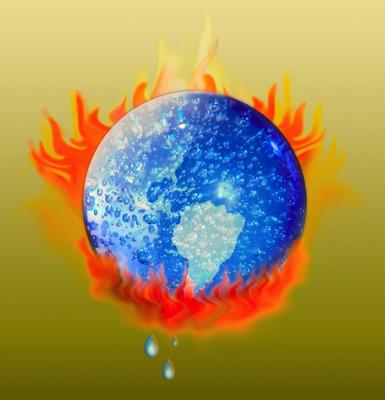
The answer is very simple. India depends on mother nature far more than any other country. The dependence of India's agricultural ouput is the best example. A drought or a flood has a major impact on the amount of foodgrains that country is able to produce. Another major reason is that India is essentially started to feel the imacts of global warming already.
- The Himalayan glaciers are shrinking at a rate of 10 to 15 metres every year. This means water shortages for about 500 mn people.See link.
- Sea levels - As the global warming sinks in the sea levels are bound to rise. This would cause the low-lying areas to be submerged in sea. The danger can clearly be seen with the last week's high tide warning on mumbai. If high tide would have happened, many parts of Mumbai - the financial capital of india would have been under water for quite some time. See link
- Due to very limited scientific approach to agriculture, most of the Indian farmer rely on rain for a good yield. However, with the increasing global warming, the weather pattern has become more erratic directly impacting the yield of the farm. See link
- Finally, looking at the place where I live - Pune. A simple observation here - The winter was warmer in 2008-09 compared to the one in 2007-08. Similarly the summer was hotter than normal. There was a delay in the onset of monsoon. This resulted in water shortages and cut in daily water supply.
Sceptics can say that I am taking a sample data of one year and India most part of in its history have faced such situations. Yet, scores of studies on climate change across the world and india has come up with the same result. Global warming is for real and its impact life-threatening.
Thus it is imperative for India to look at global warming as a problem it has to solve rather than put the ownership on the international community. Ending this post on an english translation of sanskrit subhashita learned during school
"It is not wise to start building a well when a house is on fire"
PS: In my last post, I had said that India rightly has rejected caps on its emission. Why I said? More on that in my next post.
Here's the complete verse that you have mentioned.
ReplyDeleteचिन्तनीया हि विपदाम्
आदावेव प्रतिक्रिया ।
न कूपखननं युक्तम्
प्रदीप्ते वह्निना गृहे ॥
One should foresee the effects of a problem and decide how to react to them well in advance. It is improper to dig a well when the house is on fire.
"Prevention is better than cure"
"A danger foreseen is half avoided"
"Better safe than sorry"
Source: Subhashita Manjari Blog
I had forgotten it completely. Thanks for publishing it!
ReplyDeleteKeep visiting :)